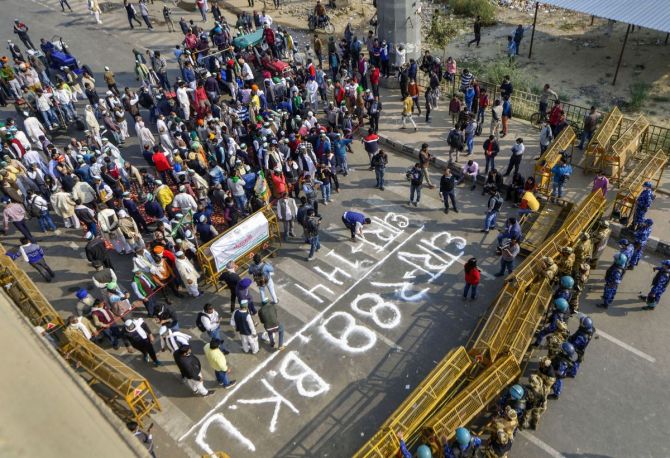"We are not here to fight. We are here to demand what is ours," says Gulzar Singh, a farmer from Uttar Pradesh who is camping at the Delhi-Ghazipur border with nearly 350 others from his state and neighbouring Uttarakhand against the Centre's new farm laws.

"We never wanted these laws in the first place, they have only compounded our troubles," says Singh, who has come from Shahjahanpur.
While the government has initiated talks with representatives of various farmers' unions to resolve the deadlock over these laws, Singh rued that no government representative has visited the protest site to speak to the protesters.
Enacted in September, the three farm laws are anticipated to bring "reforms" in the agriculture sector by removing middlemen and allowing farmers to sell their produce anywhere in the country.
Farmers worry these laws will eliminate the safety net of the minimum support price and do away with mandis that ensure earning.
But the government says the MSP system will continue and the new laws will give farmers more options to sell their crop.
The protesting farmers, largely from different legs of the Bharatiya Kisan Union, dubbed the three laws as "anti-farmer" and claimed they infringe upon their basic right to sell their produce at MSP.
Alok Solanki, who came from UP's Kannauj to join the protest, said the government's claim that the laws will not dismantle the MSP mechanism is chhalava (trickery).
"Currently, only six per cent of farmers' produce ends up being sold at MSP. The rest is bought by private companies at whimsical prices," he claimed.
"On the other hand, education and healthcare are becoming expensive. The farmer is stuck in the midst of all this. We are selling cheap and buying expensive. The government is playing two-faced politics," he said.
Farm leaders met Union ministers on Tuesday, but the two sides failed to break the deadlock. The next round of talks is scheduled to be held on Thursday.
An MBA graduate, Solanki said the government has failed to address problems faced by farmers like high interest rates on farming equipment, pending payments, and loan waivers.
"Most of the farmers who have come here on their tractors are paying compound interest on their vehicles. We have been asking for loan waivers but they have not paid any heed to that," he said.
"In most cases, the farmers don't get paid on time. So many of us sold our crops months back, but haven't received the payment yet. How will we sustain ourselves, or run our farms if we don't have money?" he asked.
Baldev Balwinder Singh from Muzaffarnagar, a member of the BKU, echoed the sentiment.
"What is the point of Modi's 'Digital India' if we have to wait for months to get paid?" he asked.
Singh, who has been camping at the Delhi-Ghazipur border since November 27, said the new farm laws will "crush" the country's farming community.
"With rising inflation, salaries of professionals across the country, including government employees, have increased but only farmers' earnings have been decreasing," he said.
Singh fears the laws will have a ripple effect, impacting not just farmers but also local vendors and consumers.
"Even today, Rs 70/kg worth of produce is bought by private entities at Rs 7, but is sold to the consumer at Rs 70. Both farmers and consumers are losing.
"Only the corporates and industrialists will benefit from these laws. This government is a puppet in the hands of Adani and Ambani," he said.
In his 'Mann Ki Baat' address last Sunday, Prime Minister Narendra Modi said these reforms have not only freed farmers from various shackles but also opened doors of new opportunities for them.
Modi said the farm laws have begun mitigating the troubles of farmers in a short period of time as he cited the example of a Maharashtra farmer who used their provisions to get the money a trader had promised but not paid to him in time.
However, many like Lalita Rawat from Uttarakhand's Nainital are not convinced.
"Under the new laws when the mandis will cease to exist, we will be forced to sell our crops at negligible prices to private entities. If that happens we will end up starving," said Rawat, a small farmer who joined the protest on Tuesday.
"We have left our children back home to come here to join the movement. It is our responsibility," she said.
A Tricolour stands at the center of the protest site dotted by green and white BKU flags.
Farmers chant slogans like Kisan ekta zindabad (Hail farmers' unity), MSP lagu karo, kaala kanun vapas lo (Implement MSP, roll back black law).
Camping at the Delhi-Ghazipur border for a week now, the farmers will take shelter under the Ghazipur flyover while some will head to the homes of their friends and relatives as the night falls, only to return the next morning.











 © 2025
© 2025